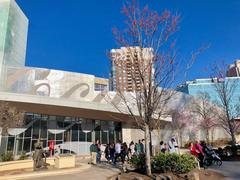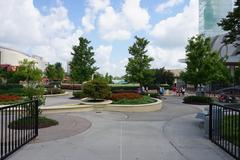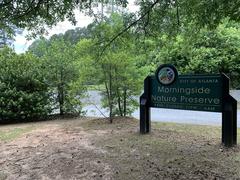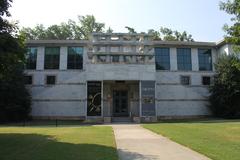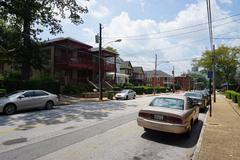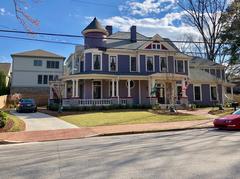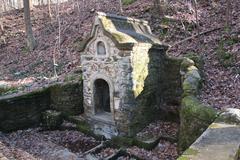Visiting Hours, Tickets, and Highlights of Woodlands Garden, Atlanta
Date: 01/08/2024
Introduction
Nestled in the heart of Decatur, Georgia, Woodlands Garden is an eight-acre urban sanctuary that offers a serene escape from the hustle and bustle of Atlanta. Established in the mid-20th century by Dr. Chester Morse and Eugenia Slack Morse, this verdant haven has evolved from an overgrown farm into a meticulously cultivated woodland garden. The Morses’ visionary efforts to preserve green space amidst rapid urbanization led to the donation of their property in 2002, transforming it into a cherished public garden (Woodlands Garden Story, Wikipedia). Today, Woodlands Garden stands as a testament to ecological conservation and community engagement, boasting over 30 species of trees and offering a plethora of educational programs for all ages (Smithsonian Magazine). Whether you’re a nature enthusiast, a student, or someone seeking tranquility, Woodlands Garden provides a unique blend of natural beauty and educational opportunities. This guide will delve into its rich history, ecological significance, visitor information, and ways to engage with this urban oasis.
Table of Contents
- Introduction
- History and Significance of Woodlands Garden
- Ecological and Educational Significance
- Community Engagement and Events
- Visitor Information
- FAQ
- Conclusion
History and Significance of Woodlands Garden
Origins and Founding
Woodlands Garden has its roots in the mid-20th century. Dr. Chester Morse of Massachusetts and Eugenia Slack Morse of Decatur acquired the land in 1946 when Scott Boulevard was a dirt road, and the property was an overgrown farm dominated by honeysuckle (Woodlands Garden Story). The Morses expanded their property to create a seven-acre tract, meticulously cultivating it into a woodland garden. Their vision was to preserve this green space amidst Decatur’s rapid urbanization. In 2002, they made the momentous decision to permanently preserve their home and its surrounding land from development (Wikipedia).
Transition to Public Garden
In 2002, the Morse family officially donated the seven-acre property to the community, transforming it into a public garden. This marked the beginning of its journey as a protected urban sanctuary. The garden’s mission is to educate and engage the community in the natural world (Smithsonian Magazine). In 2015, Woodlands Garden expanded by purchasing an adjacent one-acre parcel, further enhancing its capacity to serve as a native plant habitat for the Georgia Piedmont region.
Ecological and Educational Significance
Woodlands Garden is a vital ecological and educational resource, featuring over 30 species of trees, including Champion Trees like the Bigleaf Magnolia, Cucumber Magnolia, and Devil’s Walking Stick (Smithsonian Magazine). The garden also boasts a diverse collection of ferns, wildflowers, vines, and shrubs. The garden’s educational programs engage visitors of all ages. City Schools of Decatur fourth graders visit the garden to learn about Georgia flora and fauna, meeting several Georgia Science Standards. Georgia State plant biology students conduct fieldwork at the garden, and community groups participate in various activities, including yoga, Qi Gong, Tai Chi classes, and nature photography workshops (Woodlands Garden FAQ).
Community Engagement and Events
Woodlands Garden offers a range of events and programs that foster community engagement. Popular events include guided tours, nature walks, and seasonal festivals. Special events like bird-watching mornings and botanical art classes are also frequently held. For details about upcoming events, visit Woodlands Garden Events.
Visitor Information
Visiting Hours and Tickets
Woodlands Garden is open daily from dawn to dusk, and admission is free. Donations are appreciated to help maintain the garden and support its programs. For the most up-to-date visiting hours and ticket information, visit Woodlands Garden Visitor Info.
Accessibility and Amenities
The garden is accessible to visitors with mobility challenges, with paved paths and benches available throughout. Restrooms are located at the visitor center. Pets are not allowed to ensure the protection of the plant species and wildlife.
Travel Tips and Nearby Attractions
Woodlands Garden is easily accessible by car or public transportation. Parking is available on-site. Visitors may also enjoy nearby Decatur historical sites, such as the Decatur Cemetery and the DeKalb History Center.
FAQ
What are the best visiting times?
The garden is beautiful year-round, but the best times to visit are during the spring and fall when the flora is most vibrant.
Is Woodlands Garden accessible for disabled visitors?
Yes, the garden has paved paths and benches to accommodate visitors with mobility challenges.
What amenities are available?
Restrooms are available at the visitor center. The garden also offers guided tours and educational programs.
Conclusion
Woodlands Garden is a treasured urban sanctuary offering rich history, ecological diversity, and educational opportunities. Whether you’re a local or a visitor, there are numerous ways to engage with and enjoy this beautiful green space. Visit the garden, participate in a guided tour, or join one of the many community events. For more information and updates, follow Woodlands Garden on social media or visit their website.
References
- Woodlands Garden Story, 2023, Woodlands Garden woodlandsgarden.org
- Woodlands Garden, 2023, Wikipedia wikipedia.org
- Woodlands Garden, 2023, Smithsonian Magazine smithsonianmag.com
- Atlanta Botanical Garden, 2023, Reclaiming Wonders reclaimingwonders.com
- Woodlands Garden, 2023, Secret Atlanta secretatlanta.co
